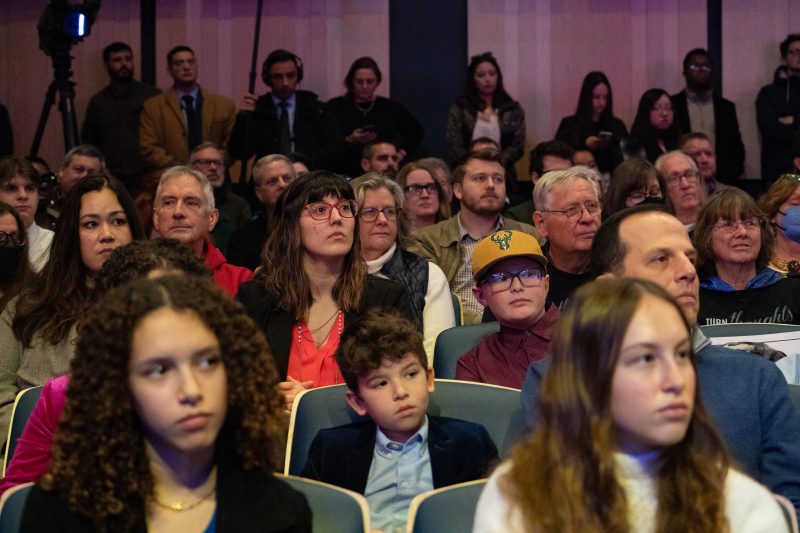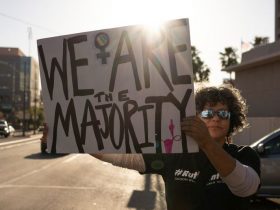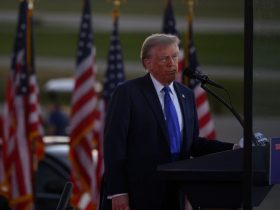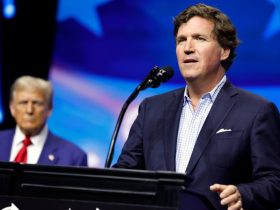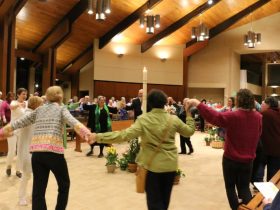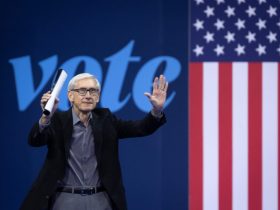One of the underrecognized elements of the country’s political tensions is the unusual generational split that exists at the moment. America is getting more gray and less White, both trends that overlap with age, given that the increased racial diversity the country is seeing is largely a function of younger people. Power is transitioning from the former to the latter, too quickly in the eyes of many older Americans and too slowly in the eyes of many younger ones.
President Biden and his reelection bid are caught in the turmoil.
It is clear at this point that Biden and his party cannot rely on younger, Black and Hispanic voters to be as reliable as they have been in the past. The extent to which the campaign should be concerned over the short term has repercussions for how concerned the party should be over the long term, so trends in recent polling showing modest gains for Donald Trump are fodder for endless rumination. But to an extent, the issue at hand is fairly simple and a reflection of the aforementioned transition — not that this framing necessarily does Biden much good.
New polling from CBS News, conducted by YouGov, included larger samples of younger voters to better assess their views of the country and the election.
That poll found, among other things, that young people are less pessimistic about the country as it stands. For example, respondents under 30 were less likely to say that they were very dissatisfied with how things are going in the country or that the state of the economy was “very bad.”
To an extent, this is interlaced with politics: Younger people are still more Democratic than older Americans and more likely to support Biden. In fact, the margin by which those under 30 back Biden in the CBS News poll mirrors how they voted in 2020, according to validated polling from the Pew Research Center. The group that sees the bigger shift here is those ages 30 to 44 — millennials, rather than Gen Z.
Both of the youngest groups were also more likely than older groups to express unhappiness with the major-party candidates.
As other polling has indicated, the issues that are motivating younger voters are similar to those motivating older ones: the economy, inflation and concerns about democracy. Below that, though, there are differences: Trump’s focuses of crime and the border are far less important to the youngest respondents than the oldest while issues such as climate change, abortion and gun policy are seen as more important.
This isn’t a novel observation, really. It’s been understood for some time that issues such as gun control and climate change are central motivations for younger Americans, growing up in an environment where those issues are much more salient. (For example: Six in 10 respondents under 30 told YouGov that they were very or somewhat concerned about gun violence while in school; only 1 in 10 of those over 65 said the same.)
Asked who they believed understood their concerns, about half of respondents under 30 said neither Biden nor Trump. A plurality of those ages 65 and over, though, said that Trump understood the concerns of those under 30 — again, probably a reflection of the politics of that age group more than anything.
There is a pervasive (and not unwarranted) sense among younger Americans that there are now fewer opportunities for people in their age range to get ahead. Just under half said that it was harder for them to go to a good college than older generations (though younger Americans are more likely to be college-educated than older ones). A vast majority said that other life achievements, such as getting a good job or buying a home, were harder for them than they had been for previous generations.
Yet there is still optimism. Six in 10 of those under 30 told the pollsters that they expected to achieve the American Dream, compared with 4 in 10 of those ages 30 to 44. (Six in 10 of those ages 65 and older said they’d achieved the American Dream.) In part, that’s because younger voters see the current dominance of older, White politicians as an impediment. Two-thirds of those under 30 said that things would be better with more young people elected to office; a majority said things would be better with more women and people of color.
Those under 30 recognize that they are a dominant factor in pop culture but see themselves disadvantaged in the political and economic power centers.
As an aside, this is one reason we see social media and culture as a point of generational tension. It is younger Americans — a population now larger than the baby boom — using their existing power and influence to put pressure on older Americans. For older Americans, there’s an uncomfortable novelty to it, as well. Not only has the baby boom gone for decades without its power being challenged, but the ability of young people to directly confront those in positions of power through social media and other online tools is a new development in the past 20 years.
You can see, though, how this is disadvantageous for Biden. Respondents overall, including younger Americans, were more likely to cite his age as worrisome than they were to say the same of Trump. But they also expect more from government than Biden is able to deliver. Recent Pew data shows that young people are most eager for the federal government to do more — but the government is unusually incapable of getting much done.
Biden’s executive actions, like on student loans, got good reviews from young people, but they are more concerned about other places where his power is either constrained, like guns (see a new development Tuesday), or necessarily incremental, like climate change.
So most young people say that the country simply can’t solve its problems.
Biden is the head of a government that younger voters are also more likely to say they don’t trust. The president and his allies make the pitch to those voters that, even if things aren’t getting better, they could still get worse. Younger voters are dubious (as well as generally being less likely to pay attention to the race).
This generational tension predates Biden, creating the environment in which the 2024 election is unfolding. It is possible that young Americans will still turn out and help make the difference for Biden’s reelection. It is also possible that — after years of frustration at watching the government do little to address their concerns and after years of seeing older Americans retain the majority of political power — they won’t.

